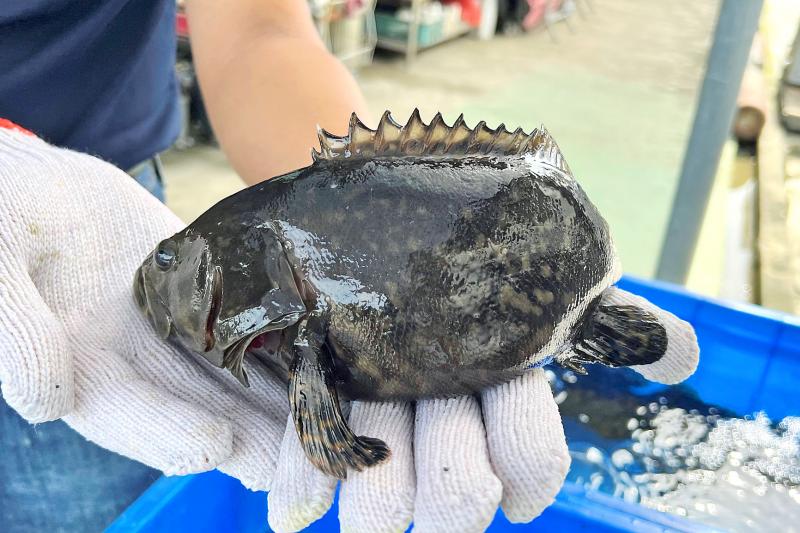Japanese fish farmers are ready to help Taiwan after China banned Taiwanese grouper imports, the Sankei Shimbun reported yesterday.
The Chinese General Administration of Customs suspended imports of the fish on Monday last week, citing prohibited chemicals and excessive levels of oxytetracycline allegedly found in grouper imports since December last year.
Soichiro Hayashi, president of the Hayashi Trout Farm in Japan’s Fukushima Prefecture, is leading the push for Taiwanese grouper imports, the newspaper said.

Photo: Yang Chin-cheng, Taipei Times
His call has caught the attention of several large sushi chains, the report said.
Hayashi, who is the Fukushima branch head of the Friends of Lee Teng-hui Association in Japan, is supportive of Taiwan and wants to return Taiwan’s kindness after it helped with relief efforts after the March 11, 2011, earthquake, the report said.
Fish from disaster-stricken areas were difficult to sell immediately after the earthquake, given fears of radiation after the meltdown at the Fukushima Dai-ichi nuclear power plant, Hayashi told the Sankei Shimbun.
“The feeling of not being able to sell the fish that you work so hard to breed resonated with me,” he said.
Former minister of foreign affairs Mark Chen (陳唐山), who heads the Friends of Shinzo Abe Association, established this month, introduced Hayashi to fish farmers in Pingtung County, the newspaper said.
Hayashi plans to import two to three tonnes of grouper samples for restaurateurs, and hopes to send a group to Taiwan to inspect the farms’ conditions before importing larger quantities, it said.
Grouper fish is delicious and many Japanese would support Taiwan in this cause as it fights Chinese oppression, Hayashi told the newspaper, adding that the “democratic fish” could become a trend and add to demand.
Chen Chien-han (陳建翰), a fish farmer in Pingtung, yesterday said that he is grateful for Hayashi’s gesture.
“It is a cycle of kindness,” Democratic Progressive Party Legislator Cheng Yun-peng (鄭運鵬) said yesterday, adding that Japanese businesses are looking for opportunities to help Taiwan.
The Tokyo-based Taiwan Trade Center has contacted several aquatic product importers and traders to arrange a deal, director Raymond Chen (陳英顯) said.
The high price of grouper is its largest obstacle when exporting to Japan, given that Japanese have a wide variety of fish to choose from, Chen said, adding that imported fish is rarely seen in Japan apart from cod and salmon.
Meanwhile, Taiwan-Japan Relations Association Chairman Su Jia-chyuan (蘇嘉全) is planning to visit Japan-Taiwan Exchange Association Chairman Mitsuo Ohashi in Japan this week to exchange views on issues of mutual concern, sources with knowledge of the matter said.
Su is also scheduled to visit the Hayashi Trout Farm during his trip and attend events to promote Taiwanese grouper, they said.
Additional reporting by Lu Yi-hsuan

CHAOS: Iranians took to the streets playing celebratory music after reports of Khamenei’s death on Saturday, while mourners also gathered in Tehran yesterday Iranian Supreme Leader Ayatollah Ali Khamenei was killed in a major attack on Iran launched by Israel and the US, throwing the future of the Islamic republic into doubt and raising the risk of regional instability. Iranian state television and the state-run IRNA news agency announced the 86-year-old’s death early yesterday. US President Donald Trump said it gave Iranians their “greatest chance” to “take back” their country. The announcements came after a joint US and Israeli aerial bombardment that targeted Iranian military and governmental sites. Trump said the “heavy and pinpoint bombing” would continue through the week or as long

TRUST: The KMT said it respected the US’ timing and considerations, and hoped it would continue to honor its commitments to helping Taiwan bolster its defenses and deterrence US President Donald Trump is delaying a multibillion-dollar arms sale to Taiwan to ensure his visit to Beijing is successful, a New York Times report said. The weapons sales package has stalled in the US Department of State, the report said, citing US officials it did not identify. The White House has told agencies not to push forward ahead of Trump’s meeting with Chinese President Xi Jinping (習近平), it said. The two last month held a phone call to discuss trade and geopolitical flashpoints ahead of the summit. Xi raised the Taiwan issue and urged the US to handle arms sales to

A magnitude 5.6 earthquake struck off the coast of Yilan County at 12:37pm today, with clear shaking felt across much of northern Taiwan. There were no immediate reports of damage. The epicenter of the quake was 16.9km east-southeast of Yilan County Hall offshore at a depth of 66.8km, Central Weather Administration (CWA) data showed. The maximum intensity registered at a 4 in Yilan County’s Nanao Township (南澳) on Taiwan’s seven-tier scale. Other parts of Yilan, as well as certain areas of Hualien County, Taipei, New Taipei City, Taoyuan, Hsinchu County, Taichung and Miaoli County, recorded intensities of 3. Residents of Yilan County and Taipei received

Taiwan has secured another breakthrough in fruit exports, with jujubes, dragon fruit and lychees approved for shipment to the EU, the Ministry of Agriculture said yesterday. The Animal and Plant Health Inspection Agency on Thursday received formal notification of the approval from the EU, the ministry said, adding that the decision was expected to expand Taiwanese fruit producers’ access to high-end European markets. Taiwan exported 126 tonnes of lychees last year, valued at US$1.48 million, with Japan accounting for 102 tonnes. Other export destinations included New Zealand, Hong Kong, the US and Australia, ministry data showed. Jujube exports totaled 103 tonnes, valued at